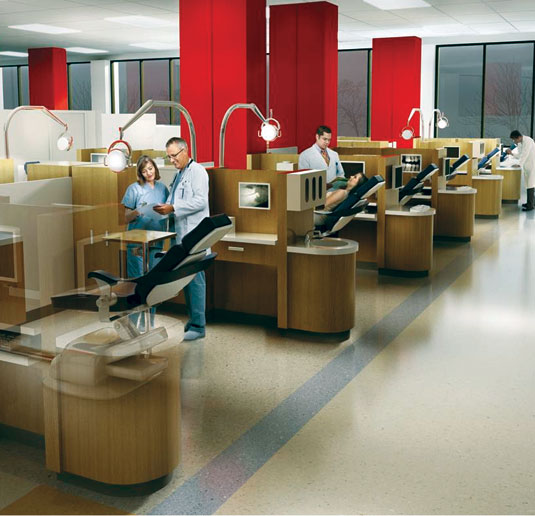Outpatient clinic among initiatives that extend dental school’s service

Several new Kornberg School of Dentistry initiatives will expand the delivery of oral healthcare in Philadelphia’s underserved communities.
The initiatives include establishing an outpatient community dental clinic at the school; creating a Master of Public Health degree track with the College of Health Professions and Social Work to train dentists to promote community health; and enhancing the pediatric dentistry program and its community outreach. Three federal grants from the Health Resources and Services Administration, which is part of the U.S. Department of Health and Human Services, will fund the implementation of the new efforts.
“This will be the first program in the country where we are combining education in clinical dentistry with public health,” said Kornberg School of Dentistry Dean Amid Ismail, who received a five-year, $2.17 million grant to establish the new outpatient community dental clinic, which will serve as a model for the practice of dental care in urban areas. “Most of our current dental programs focus solely on clinical training of dentists.
“This new clinic will significantly increase the capacity of Temple’s dental school to provide oral health services to the community,” he said. “While it will be part of the dental school, it will operate separately as a community dental clinic.”
The new outpatient clinic will be separate from the Kornberg School’s existing educational dental clinic, at which student dentists serve nearly 19,000 people (80,000 visits) per year under the close monitoring of Temple faculty. The new clinic will be staffed by full-time dentists and support personnel as well as dental residents in the new MPH program, and it will expand the capacity of the school to meet the extensive dental needs of the community in North Philadelphia, said Ismail.
The new dentistry/public health program will accept two dentists per year. The dentists will complete one year of advanced education in general dentistry (AEGD) at the community dental clinic and then work there for an additional two years. During their second year at Temple, the residents will work 30 percent of the time as staff dentists in the clinic while completing core Master of Public Health (MPH) courses in the College of Health Professions and Social Work. In their third year, they will work 70 percent of their time in the clinic as they complete MPH elective courses and a final project focused on oral health issues in the context of a community dental clinic.
“The unique focus of the MPH program is really preparing dentists to work in underserved communities — whether urban or rural — and for them to gain valuable knowledge and experience in the business part of operating a community health or dental clinic,” said Ismail.
The community dental clinic is a new concept in dental education, said Ismail. “Temple University’s commitment to health promotion in urban areas has guided the dental school faculty to develop this new model with the expressed purpose of training dentists to work in community dental clinics serving residents of urban areas in the U.S.,” he said.
Ismail said that the new outpatient clinic will be in operation by July 2011, with the first cohort of MPH students enrolled beginning July 1.
A second $298,000 grant was awarded to Meredith Bogert, associate professor and director of the Advanced Dental Education program, to completely equip the new 10-chair outpatient clinic.
A third, five-year $1.64 million grant was awarded to Mark Helpin, acting chair of Pediatric Dentistry in the Kornberg School, to implement a new paradigm for education in pediatric dentistry and support oral health outreach into the community.
“The university has a commitment to the community, and the dental school has a commitment to the community,” said Helpin. “Our dean has an extraordinary commitment to try and improve access to care. Through this grant we’re going to participate in improving the quality and the amount of care we deliver.”
The grant will be used for training dental students, medical students and other medical personnel in infant dental care and oral healthcare, in an effort to establish the concept of “health homes” for parents with children.
“If you take your child to a dentist, you’re trying to establish a ‘dental home’ for that child, and if you take a child to a pediatrician, that’s going to be their ‘medical home,’” said Helpin. “What we’re trying to do is bring these two concepts together so that people think in terms of a ‘health home,’ because oral health is an important component of good overall general health for a child.”
Helpin said they would be working in the community to increase awareness of the importance of good oral health by emphasizing early intervention, oral health and nutritional literacy.